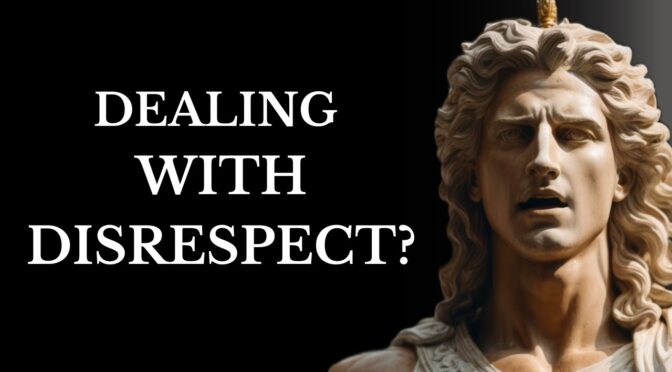This article is based on a video titled “10 stoic lessons to handle disrespect” by The Stoic Community™. The video delves into the ancient philosophy of Stoicism and offers ten practical principles for handling disrespect in various life situations.
Contents
- 1. The Power of Calmness
- 2. The Art of Self-Reflection
- 3. The Importance of Pausing
- 4. Practicing Empathy
- 5. Focusing on Virtue
- 6. Embracing Acceptance
- 7. The Role of Humor
- 8. Setting Boundaries
- 9. The Power of Forgiveness
- 10. Changing Perspective
- The video
1. The Power of Calmness
The video starts by emphasizing the Stoic principle that our emotional reactions are not triggered by external events but by our own interpretations of them. When someone disrespects you, it’s crucial to remember that their actions are a reflection of their own thoughts and feelings, not your worth (it’s fascinating how this simple shift in perspective can alter your emotional state).
2. The Art of Self-Reflection
Stoicism encourages self-examination and self-improvement. When faced with disrespect, it’s beneficial to ask yourself questions like, “Is there any truth in what the person said?” or “Did I do anything to provoke this?” This process of self-reflection can provide valuable insights into both the situation and your own behavior.
3. The Importance of Pausing
The video advises taking a moment to pause when confronted with disrespect. This pause allows you to regain control over your emotions and offers the opportunity to respond in a more measured and thoughtful manner (sometimes, a simple pause can make all the difference in the world).
4. Practicing Empathy
Stoicism also advocates for empathy. Try to understand the perspective of the person who disrespected you. This understanding can help you see that the disrespect may not be personal and could be a result of the other person’s own insecurities or fears.
5. Focusing on Virtue
Stoicism places a high value on virtues like wisdom and courage. When disrespected, the philosophy advises focusing on these virtues in your response. This focus allows you to maintain your dignity and integrity while also providing an opportunity for personal growth.
6. Embracing Acceptance
Stoicism teaches the importance of distinguishing between what is in our control and what is not. When faced with disrespect, it’s advised to focus on what you can control—your own thoughts, feelings, and actions—and to accept what you cannot.
7. The Role of Humor
Humor can serve as a useful tool for diffusing tension and maintaining emotional balance. A witty remark or playful joke can often turn a confrontational situation into a more positive experience.
8. Setting Boundaries
Stoicism is not about passivity; it’s about standing firm and setting clear boundaries. When someone disrespects you, you have the right to assert yourself and demand to be treated with dignity and respect.
9. The Power of Forgiveness
Forgiveness, according to Stoicism, is not just a favor to the other person but a gift to yourself. It frees you from the burden of negative emotions and allows you to move on with a sense of inner peace.
10. Changing Perspective
The final lesson from the video is about the power of perspective. It helps you see that most cases of disrespect are minor and temporary and do not affect your true worth or happiness. By changing your perspective, you can focus on what truly matters in life—your goals, values, and virtues.

